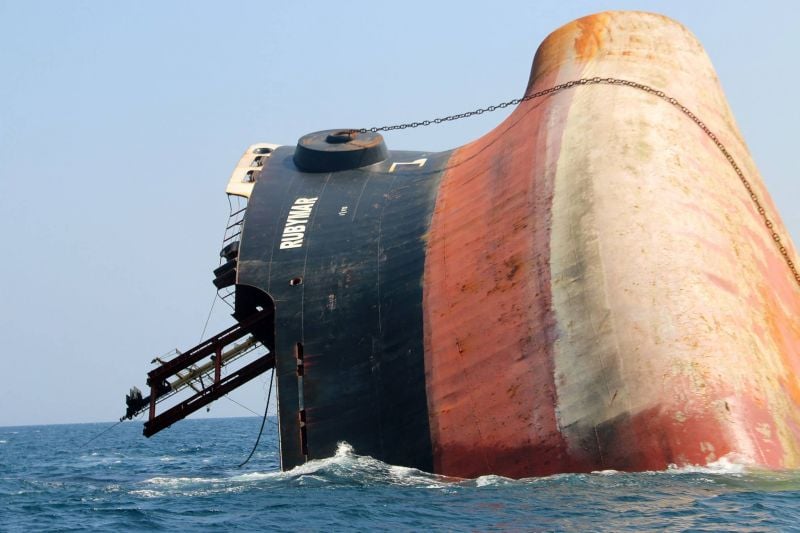
The Rubymar partially submerged off the coast of Yemen, March 7, 2024. (Credit: Khaled Ziad/AFP
The sunken Rubymar cargo ship, damaged in a Houthi attack off the coast of Yemen, presents no "immediate danger" of pollution, according to Cedre, an organization specialized in marine pollution commissioned by the United Nations.
"At this stage, there is no immediate danger," Christophe Logette, director of the Center for Documentation, Research and Experimentation on accidental water pollution (Cedre), based in Brest, western France, told AFP.
Cedre has been enlisted, along with other international experts, to work on this shipwreck as part of a United Nations mission.
"For the moment, there is no real pollution. The ship is at the bottom of the sea, the hull is in relatively good condition," Logette explained.
Damaged by Yemeni rebel missiles on Feb. 18, the Belize-flagged, UK-owned, Lebanese-operated freighter sank at dawn on March 2 after being evacuated and abandoned.
The vessel's 200 tonnes of bunker fuel and 80 tonnes of diesel oil "are in their bunker inside the ship, there is no leak," according to Cedre.
As for the 22,000 tonnes of ammonium phosphate and sulfate fertilizers, "they are in their storage compartment and there is currently no trace of this product being released into the marine environment," said Mr. Logette.
"The main concern is what will happen to the 22,000 tonnes of fertilizer if it is released immediately into the marine environment on a massive scale," he said.
If such a spill were to occur, it would release "an enormous amount of nitrogen" into the Red Sea, causing "significant concentrations of algae that will suffocate the surrounding marine environment," Logette said. "But that's not the current situation."
"This is solid fertilizer, in granules, to be spread on fields. These granules will dissolve slowly, after several hours in the marine environment."
As a result of the sinking, "water has probably infiltrated the hull and the cargo. This fertilizer will be wetted and will dissolve very slowly in very low concentrations, with a very limited effect on the marine environment," he explained.
The wreck lies south of the Hanish Islands, between Yemen and Eritrea. "The Red Sea is a very rich environment from an ecosystem point of view. We hope that the problem will not be a serious one," he concluded.